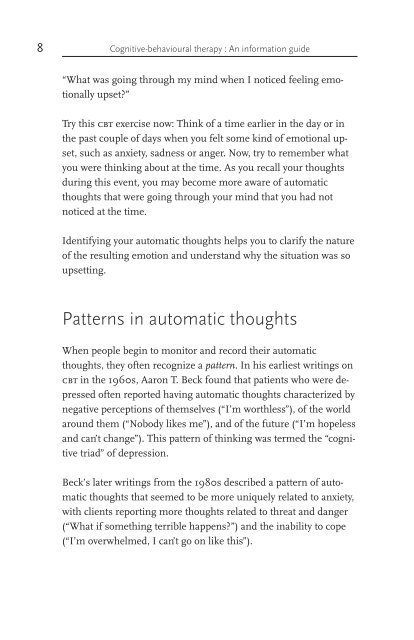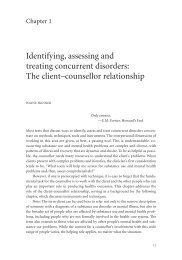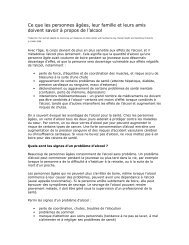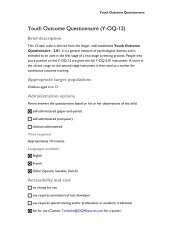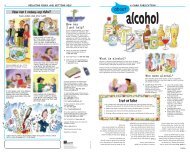Cognitive-behavioural therapy: An information guide - CAMH ...
Cognitive-behavioural therapy: An information guide - CAMH ...
Cognitive-behavioural therapy: An information guide - CAMH ...
Create successful ePaper yourself
Turn your PDF publications into a flip-book with our unique Google optimized e-Paper software.
8 <strong>Cognitive</strong>-<strong>behavioural</strong> <strong>therapy</strong> : <strong>An</strong> <strong>information</strong> <strong>guide</strong><br />
“What was going through my mind when I noticed feeling emotionally<br />
upset?”<br />
Try this cbt exercise now: Think of a time earlier in the day or in<br />
the past couple of days when you felt some kind of emotional upset,<br />
such as anxiety, sadness or anger. Now, try to remember what<br />
you were thinking about at the time. As you recall your thoughts<br />
during this event, you may become more aware of automatic<br />
thoughts that were going through your mind that you had not<br />
noticed at the time.<br />
Identifying your automatic thoughts helps you to clarify the nature<br />
of the resulting emotion and understand why the situation was so<br />
upsetting.<br />
Patterns in automatic thoughts<br />
When people begin to monitor and record their automatic<br />
thoughts, they often recognize a pattern. In his earliest writings on<br />
cbt in the 1960s, Aaron T. Beck found that patients who were depressed<br />
often reported having automatic thoughts characterized by<br />
negative perceptions of themselves (“I’m worthless”), of the world<br />
around them (“Nobody likes me”), and of the future (“I’m hopeless<br />
and can’t change”). This pattern of thinking was termed the “cognitive<br />
triad” of depression.<br />
Beck’s later writings from the 1980s described a pattern of automatic<br />
thoughts that seemed to be more uniquely related to anxiety,<br />
with clients reporting more thoughts related to threat and danger<br />
(“What if something terrible happens?”) and the inability to cope<br />
(“I’m overwhelmed, I can’t go on like this”).


